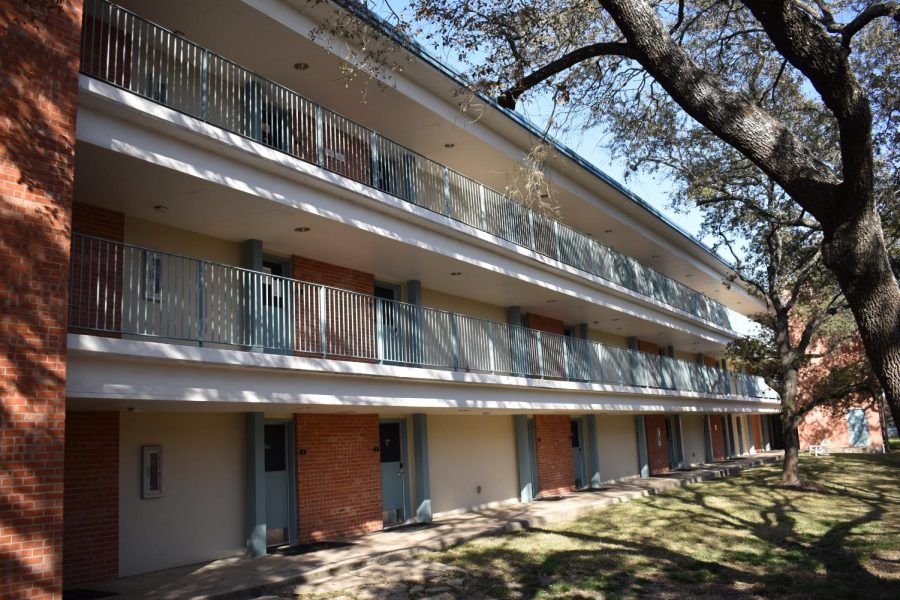Students express concern over reinstatement of residency requirement
3 year residency requirement will be enforced with exceptions
Freshmen Dorm Miller
In an email sent to Trinity students, Sheryl Tynes, vice president for Student Life, announced the reinstatement of the three-year residency requirement. In light of the COVID-19 pandemic, only first-years and a select number of other students have been allowed to live in the on-campus residence halls. As the COVID-19 vaccine becomes more readily available, residence halls are being made available to all students again.
After sending students home last March, Trinity placed a temporary suspension on the three-year residency requirement in an effort to de-densify campus. One year later, university administrators feel confident that they can bring students back to campus safely, with the three-year residency requirement reinstituted.
“We continue to face uncertainty about the continuing impact of COVID on our campus community next academic year. However, based on public health projections, we believe that our campus will more closely resemble a typical semester next Fall, with more on-campus and in-person living, learning, and teaching,” Tynes wrote in the email.
Tynes stressed the importance of the residency requirement to the Trinity community.
“When the majority of students inhabit a shared space, the opportunity to foster connections and understanding are far greater than when students only come to campus for class and then leave,” said Tynes. “Many seniors who moved off campus shared stories related to the unexpected challenges living off-campus. These included commuting to and from campus, dealing with difficult landlords, leases, utilities, cable providers, and a real feeling of disconnection from campus life.”
Residential Life has worked in partnership with the Student Government Association and multiple campus partners to come to the decision that they believe best suits the student body.
“The timeline to develop residency plans, communicate with students, and move through the entire process is lengthy. In order to be ready for students to move into their residence halls in late August, we really need to start now,” wrote Tynes.
However, students in SGA have expressed discomfort in the reinstatement of the policy.
“It’s been a topic of conversation for years, especially this semester when they decided to reinstate the policy. I would say that we’re almost unanimous that students in student government do not agree with the residency policy. The reinstatement is a decision from the administration and the board of trustees. It’s in their best interest, not necessarily ours,” said Noor Rahman, junior senator.
Other students, such as sophomore sociology major Riley Ruchti, echoed Rahman’s discontentment with the policy, as COVID-19 is still of concern.
“The university has made the decision to reopen campus with very little information. Yes, people are getting vaccinated — but there are new, more contagious variants popping up. The truth is that if there is an outbreak of COVID on campus, that will affect San Antonio in really devastating ways because we are part of the San Antonio community,” said Ruchti.
Amiya Peddada, junior communication and sociology double major and SGA senator, shared Ruchti’s concerns, acknowledging the toll that COVID-19 has taken on college campuses.
“There are numerous studies about how COVID-19 is a super spreader on college campuses. COVID-19 can lead to serious health conditions or even premature death for young people and we don’t even know the long-term effects. I think Trinity University’s decision to force students to move back to campus without the guarantee that the majority of the population will be vaccinated is extremely irresponsible,” said Peddada.
Trinity lists various benefits of the traditional three-year residency requirement on its website, including reasons such as community formation, student safety and individual growth.
“While I understand they want the camaraderie of the three-year living requirement to come back, and that people can love the campus like we used to, we’re not going to ever be able to go back in time. From this point forward, our lives are forever altered by this pandemic. And trying to reinstate a three-year residency that only hinders students is not sustainable and is truly unfair, recognizing what we’ve been through and what we’re continuing to go through,” said Rachel Kaufman, junior sociology major.
Some students have voiced concerns about the financial stress that on-campus residency creates.
“They’re retroactively setting guidelines to decide who is going to be exempt from the policy. And the way they’ve created these guidelines is classist — students who had the resources to find off-campus housing at the last minute are being rewarded with the option to live off-campus again in the fall, while students who lived at home to save money are being forced into more expensive on-campus housing,” Ruchti said.
“Friends of mine who live at home, live at home because they can’t afford to come to school. Why are you asking them to pay another $12,000 considering the economic hardships that the pandemic has already brought on? I really, truly hope that the administration recognizes that what they’re doing is harming their student’s mental well-being and financial well-being,” Kaufman said.
Because they were not allowed to live on campus in the fall, many sophomores and juniors moved into apartments off-campus. This would conflict with the residency requirement, as many students signed years-long leases. Residential Life has addressed this, urging rising juniors to fill out an opt-out form so they don’t have to live on campus next semester. The Residential Life team looked through about 160 requests who were notified of their status on Feb. 23.
Besides current sophomores, students with underlying health and disability-related conditions are also allowed to refuse the residency requirement next year through a separate process for requesting accommodations with Student Accessibility Services.
“These requests include but are not limited to: adjustments in how many people share a residence, location of residence on campus, and preclusion to living on campus,” wrote Tynes. “Student Accessibility Services will work individually with students to determine the most reasonable accommodation possible given the totality of information provided during the review process.”
Though there are concerns with the practicality and fairness of the reinstatement of the policy, Trinity is optimistic about seeing a more normal fall 2021.
“Our hope is that the fall semester will bring a return of more in-person classes, more regular student events, and obviously a robust residential social environment. If things don’t improve, then we will have to review all of this for the fall semester,” wrote Tynes.

My name is Emma and I am a sophomore from Lockhart, Texas. I have worked at the Trinitonian since Spring 2021. I am an English major and hope to become...

My name is Claire Sammons and I am an Anthropology and Communications double major. I have worked for the Trinitonian since fall of 2020. I became a photographer...











